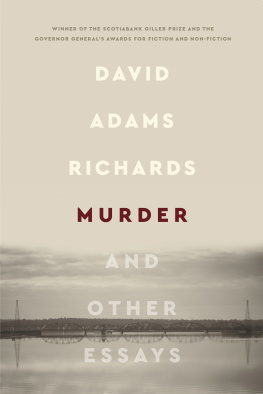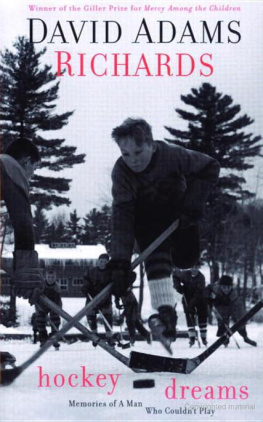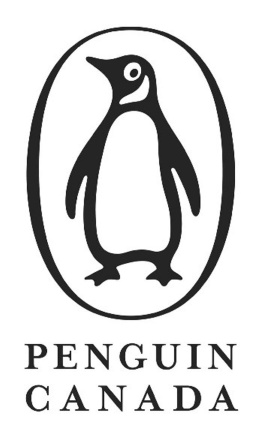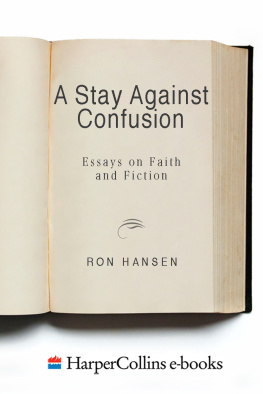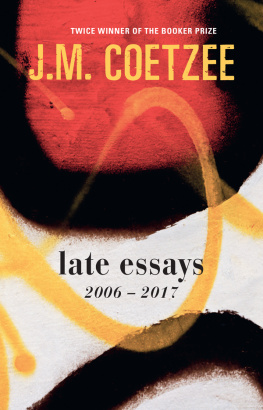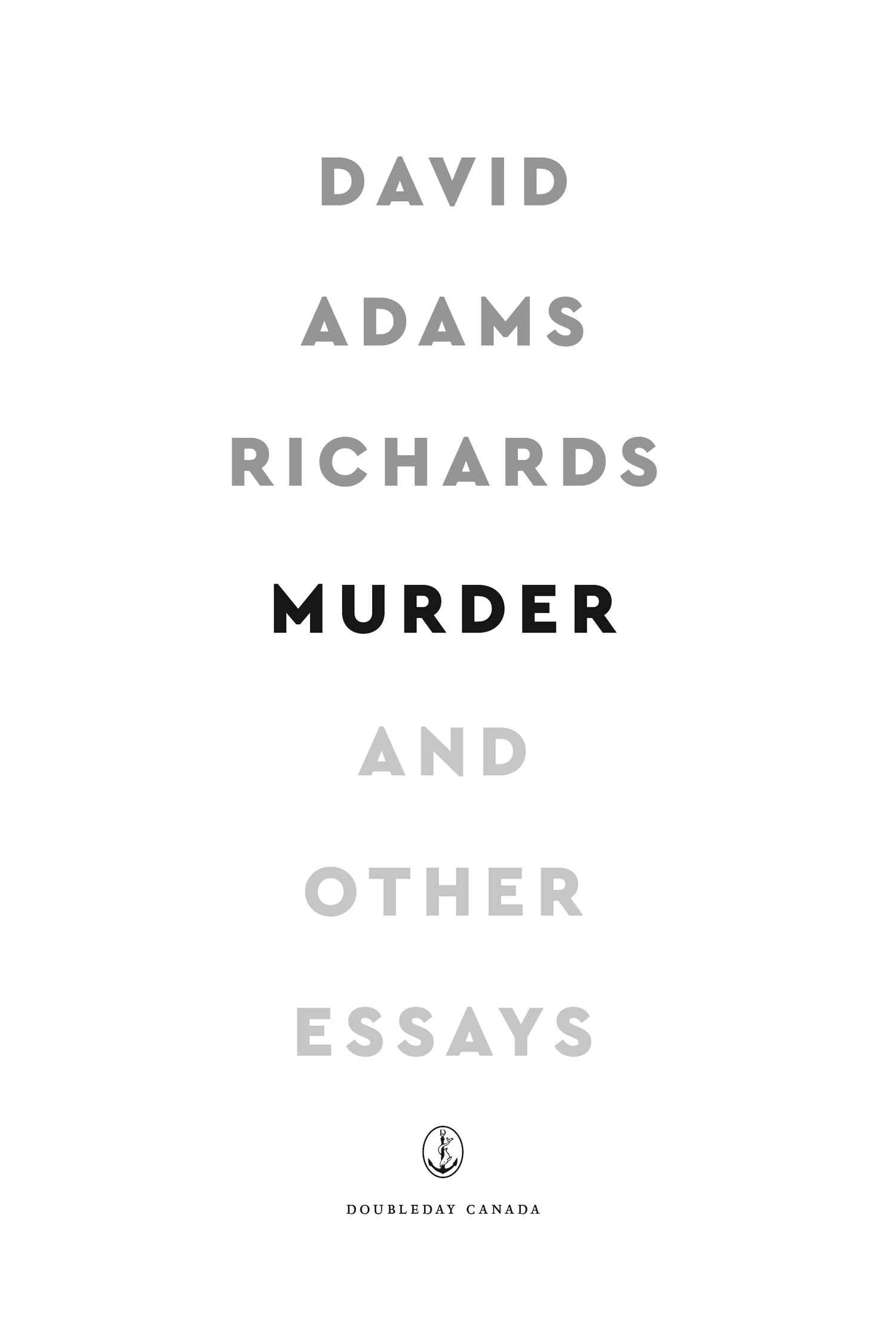Contents
Landmarks
Print Page List
BOOKS BY DAVID ADAMS RICHARDS
FICTION
The Coming of Winter Blood Ties
Dancers at Night: Stories
Lives of Short Duration
Road to the Stilt House
Nights Below Station Street
Evening Snow Will Bring Such Peace
For Those Who Hunt the Wounded Down
Hope in the Desperate Hour
The Bay of Love and Sorrows
Mercy Among the Children
River of the Brokenhearted
The Friends of Meager Fortune
The Lost Highway
Incidents in the Life of Markus Paul
Crimes Against My Brother
Principles to Live By
Mary Cyr
NON-FICTION
Hockey Dreams
Lines on the Water
God Is.
Facing the Hunter
Copyright 2019 Newmac Amusement Inc.
All rights reserved. The use of any part of this publication, reproduced, transmitted in any form or by any means electronic, mechanical, photocopying, recording or otherwise, or stored in a retrieval system without the prior written consent of the publisheror in the case of photocopying or other reprographic copying, license from the Canadian Copyright Licensing agencyis an infringement of the copyright law.
Doubleday Canada and colophon are registered trademarks of Penguin Random House Canada Limited.
Library and Archives Canada Cataloguing in Publication
Title: Murder, and other essays / David Adams Richards.
Names: Richards, David Adams.
Description: Essays. | Includes poetry by the author.
Identifiers: Canadiana (print) 20190077786 | Canadiana (ebook) 20190077794 | ISBN 9780385666558 (hardcover) | ISBN 9780307376077 (EPUB)
Classification: LCC PS8585.I17 M87 2019 | DDC C814/.54dc23
Playing the Inside Out was originally published in Playing the Inside Out/Le jeu des apparences 2008 by David Adams Richards.
Reprinted by permission of Goose Lane Editions
Cover design: Andrew Roberts
Cover image: Echunder/Shutterstock.com
Published in Canada by Doubleday Canada, a division of Penguin Random House Canada Limited
www.penguinrandomhouse.ca
v5.3.2
a
This title contains long lines of poetry. The line of characters below indicates approximately the longest line in the text:
The gunslingers are always the age we were thentwenty-one or thirty-nine
To most accurately reproduce the layout of the text on the printed page, you may choose to decrease the size of the text on your viewer and/or change the orientation of your screen until the above line of characters fits on a single line. This may not be possible on all e-reading devices. Viewing this title at a higher than optimal text size or on a screen too small to accommodate the longest lines in the text will alter the reading experience and may cause single lines of some poems to display as multiple lines of text. If this occurs, the turn of the line will be marked with a shallow indent.
This book is dedicated to my late friend the poet Eric Trethewey, and my sons, John Thomas and Peter Anton, with much love.
IN MEMORY OF ERIC TRETHEWEY
You phoned the last night you were alive
To ask if we could take a drive
Into New Orleans sometime.
I said yes, let me first get to Virginia.
You who could be as fierce as a pit bull
Left abandoned,
Or as gentle a poet as God intended,
Never quite understanding the world
Where you seemed suspended,
Fumbling for keys to some kingdom
Controlled by a sombre attendant.
When Kelly phoned the next day
To tell me you had gone,
Found dead on the floor of your kitchen,
I remembered how the phone had
Rung once more that night later on.
Oh, I said to Peg. Its Rick again
I will talk to him tomorrow.
The best of us are left fumbling for keys
To doors that remain locked
On this life we borrow.
This poem
Is addressed to you, my friend
For your courage, love and sorrow.
CONTENTS
A NOTE FROM THE AUTHOR
Some of these essays were written thirty-five years ago, some just this year. Some have previously appeared in newspapers and periodicals, and some have not. Most have not been previously published, though I did have a short book of essays published in the 1990s called A Lad from Brantford, and have taken a few essays from that.
Playing the Inside Out was formerly published in book form by Goose Lane. I have included some poems. These also span nearly three decades and most have not been previously published.
MURDER
IT WAS A JULY NIGHT AND I WAS TRAVELLING HIGHWAY 11, along the Miramichi River in northern New Brunswick. Along the way I picked up a hiker, coming from town. It was dark and warm, and the stars seemed endless; endless enough to make us reflect that anything we did couldnt much matter to the wide universe. And this in fact is what the hitchhiker reflected upon as we drove.
That we didnt matter very much at all.
So I agreed. (It is a fairly prevalent idea nowadays. It is part of the irony of the times, I suppose. That is, that any office or opinion we have is, by way of irony, lessened; and nothing much matters.)
He was a nice fellow, a First Nations man who was travelling home to his reserve. I believed he simply wanted to make conversation. Dust in the Wind was playing, a song by the group Kansastheir lyrics stating that all our dreams are futile, for we are only dust in the wind.
He concurred. Thats rightboys, oh boys, look at them starspeople think we matter, but we dont matter much
His voice belied the import of the statement, making it homey and wise and innocent.
I agreed that when you consider our galaxy and try to comprehend the billions of others, you realize we are very tiny indeed.
However, there was something else I had noticed. It gave a curious feeling of aggrandizement to say we didnt much mattera feeling of actual importance in not mattering. We felt enlivened by the prospect that we were nothing. For a while it filled up a need in us. In fact it must have filled up something to be able to say it with so much contentedness.
Infinitesimal specks of nothing that we are.
The hitchhiker said after a time that he was an atheist. That he had become one because the church had hurt his people.
The church turned me into an atheist is what he said.
The song had stopped.
I did not dispute this. That the churchand many other thingshad hurt and displaced his people. He was telling me now that he was not a Christian and did not believe. I shrugged. I was not in the mood for an argument. And it never much mattered to me what a person is or was. That in fact is my stance, and always has been, and too, at times, I am still not certain what I am.
Still, I began to realize that in saying we did not matter because there were big stars in the sky, we offered some kind of acknowledgement to at least one line: For as heaven is above earth so are my ways higher than yours, and my thoughts than your thoughts.

